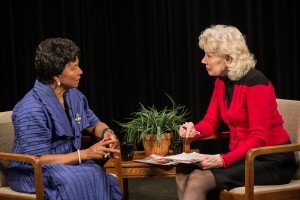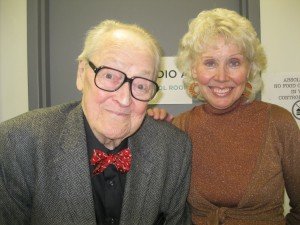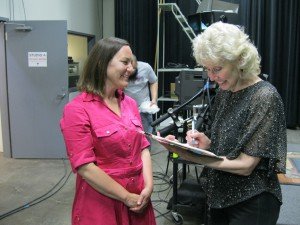By TESHA M. CHRISTENSEN
Standish-Ericsson resident and television producer Mary Hanson has been giving a voice to others for over 36 years.
“The Mary Hanson Show” is the longest running independently produced cable show in the United States. It has also been on public television since 1995.
The award-winning show focusing on health and social issues started on a whim.
At age 35, Hanson, a social work consultant attended training at the University of Minnesota. As the speaker ended and the lights went up, Hanson was dismayed to see that the brilliant speaker had an audience of about only 15 people. “I thought, ‘what a shame,’” recalled Hanson, now 73. “He should have had a packed house.”
 Photo left: Mary Hanson (right) interviews Reatha Clark King in August 2016 for an episode about “Race Relations.” Clark King grew up picking cotton. She earned her PhD and then worked as President of Metro State and V.P. at General Mills. She also was involved in research that was used with the space program, a popular topic right now due to the recently released movie, “Hidden Figures,” about other African American women who were a big part of the space program. (Photo courtesy of Tracy Walsh)
Photo left: Mary Hanson (right) interviews Reatha Clark King in August 2016 for an episode about “Race Relations.” Clark King grew up picking cotton. She earned her PhD and then worked as President of Metro State and V.P. at General Mills. She also was involved in research that was used with the space program, a popular topic right now due to the recently released movie, “Hidden Figures,” about other African American women who were a big part of the space program. (Photo courtesy of Tracy Walsh)
Mulling over the problem on her drive to work, Hanson passed by the KCHK-AM radio station she went past every day. “I didn’t think about it for one minute. I careened into the parking lot,” she remembered, walked in and asked to speak to the station manager.
He listened to her idea and then told her that he’d been looking for a way to connect with the community. She could do it--if she could find a sponsor.
Back at the nursing home where she worked, Hanson asked the administrator if he’d sponsor her radio show. He, too, had been wanting to do something for the community.
And just like that, Hanson had a show. Her next step was to buy a good tape recorder.
She’s always found it serendipitous that both of the men she talked to that day had been looking for a way to build community and give back.
Three good questions
Hanson’s show, first with the radio station and later with the fledgling cable companies, has always provided a forum for thoughtful, in-depth conversation.
She started with a five-minute show, learning that you can ask three good questions in that time frame. Soon her station manager gave her 10 minutes and kept upping it until she had a half hour show. She has found that for most topics, a half hour gives her enough time to go into depth on the issue. For those that need more, she breaks the topic up into a series, such as the 10-show series on understanding depression and suicide. Hanson pointed out that it is rare these days to get a news show that focuses on one topic for a half hour.
As a trained social worker, Hanson already knew how to ask families hard questions, so it came easily during the show. She has explored psychosocial topics such as blended families and anxiety, while branching out to medical concerns such as Alzheimer’s, infertility, and cancer treatments. Plus she features environmental topics and interviews local leaders.
From the start, she wasn’t afraid to call experts, authors, and other well-known people for interviews. They all said yes.
For her pilot cable show in 1980, Hanson scheduled Tom Wright, a marriage and family therapist, and professor, whom she had interviewed previously for her radio show, and picked a comfortable topic. That way Hanson knew that if she got too nervous and dropped the ball, Wright could carry it.
 Photo right: Mary Hanson (right) recently interviewed Dudley Riggs, the Founder of Brave New Workshop and man who helped launch the comedy careers of Al Franken, Jim Belushi and other. His new book, “Flying Funny: My Life Without a Net,” coming out in April will be the topic of a show this spring. (Photo submitted)
Photo right: Mary Hanson (right) recently interviewed Dudley Riggs, the Founder of Brave New Workshop and man who helped launch the comedy careers of Al Franken, Jim Belushi and other. His new book, “Flying Funny: My Life Without a Net,” coming out in April will be the topic of a show this spring. (Photo submitted)
As time went on, she started spending more time on the Mary Hanson Show and less as a social worker. However, she still works one day a week as a social worker consultant at Catholic ElderCare, leading support groups and bringing in speakers for families—many of which she’s interviewed for the show.
Making a difference
One of the toughest parts of the job is finding underwriters and soliciting grants. Because she’s not on anyone’s staff, she is responsible for securing funding for her show. In addition to large companies such as Blue Cross and the Hennepin County Mental Health Association, individual donors help keep her show on the air.
“I’d rather be doing something that makes a difference than working a job where I could have a large salary,” stated Hanson.
 Photo left: Over the years, Mary Hanson (right) has interviewed thousands of leaders and experts, including Kelly Drummer, the President and CEO of Tiwahe Foundation which preserves American Indian culture and supports American Indians with micro-grants. The Foundation office is located in south Minneapolis behind Savers. (Photo submitted)
Photo left: Over the years, Mary Hanson (right) has interviewed thousands of leaders and experts, including Kelly Drummer, the President and CEO of Tiwahe Foundation which preserves American Indian culture and supports American Indians with micro-grants. The Foundation office is located in south Minneapolis behind Savers. (Photo submitted)
The various awards and honors she’s received over the years have been a shot in the arm when she’s feeling on her own. One of the most special awards she received was the Hennepin County Mental Health Association’s C.A.R.E. award in 1985 for excellent educational work.
Hanson strives to present a range of topics that appeal to a variety of people, and she’s received comments from viewers that span Paul Wellstone’s public relations staff to the clerk at Super America.
Up next
For Mary, the hard part isn’t finding topics for the show...it’s narrowing them down.
“In Minneapolis and St. Paul, we have this great bunch of people. You could interview someone every day and not run out,” said Hanson.
The leadership interviews stretch her, as she feels that her strength is helping present complicated topics in a way that viewers can understand them. But she believes it is important to record the stories of leaders so they are part of the historical record. Of the 150 she’s interviewed, about 28 have died. “I’m so thankful I had the chance to get them on film,” said Hanson.
She’s working on how to package past shows together by theme to have available in libraries, schools, and history centers.
Work on translating the depression awareness series into Spanish is wrapping up. It will appear on cable and TPT in the United States and possibly Mexico. Hanson would like to do more on this topic, delving into the experience of teens and veterans with depression.
Hanson’s next mini-series will be on sex trafficking, a topic she’s working on with the Women’s Foundation of Minnesota.
Over the years, Hanson has observed some shifts on social and health issues. An interview she conducted with two men dying of AIDS in the 1980s is embedded in her memory. Back then it was a terminal condition. Today, the future is brighter.
But unfortunately, others are the same, such as child abuse and sexual abuse, and need more uncovering. Last fall, she interviewed Josie Johnson, a nationally known civil rights activist who was also the first African American woman on the Board of Regents at the U of M. When it comes to race relations, “she thinks things are actually worse now,” remarked Hanson.
Over the years, Hanson has interviewed thousands of people, including many who live near her 100-year-old South Minneapolis home, such as Lisa Larges, Outreach Coordinator for the Minnesota State Services for the Blind, and Jack Reuler, founder and Artistic Director of the Mixed Blood Theatre. Other South Minneapolis interviewees include: attorney Joanie Moberg; Hennepin County Commissioner Peter McLaughlin; Kelly Drummer, Tiwahe Foundation; US Congressman Keith Ellison; DFL Minnesota Representative Frank Hornstein; former US Representative Martin Sabo (now deceased); Tina Feigal, author, parent educator; Cam and Paul Rogers, talking about raising a child with disabilities; Camille Hanson on “An American Artist Abroad”; Roosevelt High School students talking about “The Teen Years” with author, Gisela Konopka, PHD; and stay-at-home dads Steve Richards and Josh Moberg.
Purpose in life and work
Hanson is 73, but she doesn’t plan to retire anytime soon. This is the work that gives her purpose.
“For me, the idea of being a conduit to bring the ideas, vision, knowledge and resources from the guests to the broader population has always motivated me,” remarked Hanson.
“There’s also the personal reward of working with people who are brilliant and dedicated to what they’re doing,” she added. It makes for an enriching experience for not just Hanson, but also her crew of volunteers.
With the 20 hours of research and preparation that she puts in, each show feels like taking a mini college course. “It’s an exciting benefit,” said Hanson.
The Mary Hanson show just completed its 20th season on TPT 2.2 and can be viewed on public television 26 to 30 weeks a year. It is on cable year round, appearing on Channel 6, the Metro Cable Network, which interconnects the 14 cable systems in the seven-county area, as well as the St. Paul Neighborhood Network (SPNN), the Minneapolis Television Network (MTN), and the Duluth/Superior cable system (PACT). Each show that she does is broadcast at least four times on public television and 17 times on cable. For schedules, browse www.maryhansonshow.com.
Upcoming shows
On the schedule for Mary Hanson this next year are:
• Betty McCollum, US Congresswoman, 4th district. This environmental advocate is underappreciated in the state, according to Hanson.
• Larry Long, South Minneapolis troubadour, singer, educator who has focused his music on social justice.
• Dudley Riggs, founder of Brave New Workshop, who has written a book about his experience growing up in the circus
• James Jordan, MD, Former Medical Director of the Hamm Psychiatric Clinic
• Alzheimers in the Community, which will run as a sequel to the TPT documentary on Alzheimers
More at www.maryhansonshow.com.
Comments
No comments on this item Please log in to comment by clicking here